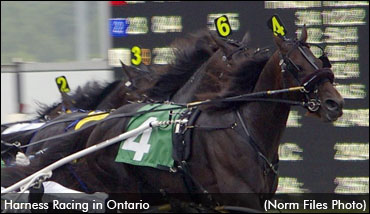"It is clear Ontarians support the existing OLG Slots-at-Racetracks Program. On the eve of the provincial budget, we are asking the government to commit to honouring the existing contracts through 2015 and work with OHRIA on a long-term plan to sustain Ontario's 60,000 horse racing jobs for many years to come."
The above quote has come from Ontario Horse Racing Industry Association President Sue Leslie, via a press release sent out during the late-morning hours of Monday, March 26.
 OHRIA is the Ontario horse-racing industry's collective voice against the provincial government's announced decision to inexplicably step away from the mutually-beneficial slots-at-racetrack program; which leads to the Ontario horse-racing industry being able to employ up to 60,000 Ontarians and create a $2-billion annual economic impact on the provincial economy.
OHRIA is the Ontario horse-racing industry's collective voice against the provincial government's announced decision to inexplicably step away from the mutually-beneficial slots-at-racetrack program; which leads to the Ontario horse-racing industry being able to employ up to 60,000 Ontarians and create a $2-billion annual economic impact on the provincial economy.
Also to be noted is that the current slots-at-racetracks program has allowed the Ontario Government to annually reap roughly $1.1-billion in direct revenue from racetrack slot machines, and has paved the way for the provincial horse-racing industry to annual pump $261-million in direct taxes to the Ontario Government each year.
For complete information, surf to value4money.ca, which succinctly conveys how important the horse-racing industry is to the Province of Ontario.
Also this morning, the Ontario Harness Horse Association is holding a large rally at Queen's Park in protest of the Provincial Liberal Government's reckless decision to hastily and inexplicably step away from the slots-at-racetracks program, a huge economic workhorse for the Province of Ontario.
The contents of OHRIA's Monday release, which states overwhelming public support for the current slots-at-racetrack program, appear below.
Sue Leslie, president of the Ontario Horse Racing Industry Association (OHRIA) is calling on Premier McGuinty to heed Ontarian's advice when it comes to the government's plans for gaming in Ontario.
According to a recent poll conducted by Forum Research for the Ontario Horse Racing Industry Association, nearly three-quarters of Ontarians say they approve of the 'Slots-at-Racetracks Program' (74%). Two thirds approve of the specific terms of the deal OLG has with Ontario's horse racing tracks (61%).
The vast majority say it is important that the 60,000 jobs connected to Ontario's racing and breeding industry stay in the province (84%), and close to one third say it is "extremely important" (31%).
Most feel that the 20% of slot revenues the tracks receive is the right percentage (43%), although many think it is too low (30%).
Three-quarters of Ontarians (77%) say it is important that the jobs and revenues created by 'Slots-at-Racetracks' be maintained, and close to one quarter say it is "extremely important" (22%)
The majority do not approve of the provincial government building more casinos (58%) and a similar proportion disapprove of a casino being built in their town (57%).
One half approve of gaming tables at racetracks (50%), and the largest group thinks the best plan for OLG is to leave slots at the racetracks and refrain from building new resort casinos. Only a small minority opt for removing slots from racetracks, either to new casinos (8%) or to purpose built slot facilities (5%).
When asked where slots should ideally be located, two thirds say "at racetracks, where they are now" (62%).
"It is clear Ontarians support the existing OLG Slots-at-Racetracks Program. On the eve of the provincial budget, we are asking the government to commit to honouring the existing contracts through 2015 and work with OHRIA on a long-term plan to sustain Ontario's 60,000 horse racing jobs for many years to come," said Leslie.
The poll was conducted by Forum Research for OHRIA between March 17 and March 22, 2012, on a sample of 1006 randomly selected respondents. Interviews were conducted by telephone using an RDD sample. The margin of error for a sample this size is plus or minus 3%, 19 times out of 20.
(OHRIA)


I think I've made more than
I think I've made more than 1,006 phone calls in the last 5 days. Nice work (if you can get it ;-) ... and encouraging results. I'm sure the Liberals are polling people with questions like: 1) If a Casino in your area resulted in significantly reduced property taxes - would you approve? ... and ... 2) If horse racing was no longer conducted in Ontario, would your life be negatively affected? They are a scandalous bunch of hooligans, and appear deaf to common sense and democratic principles. Go get 'em OHRIA.